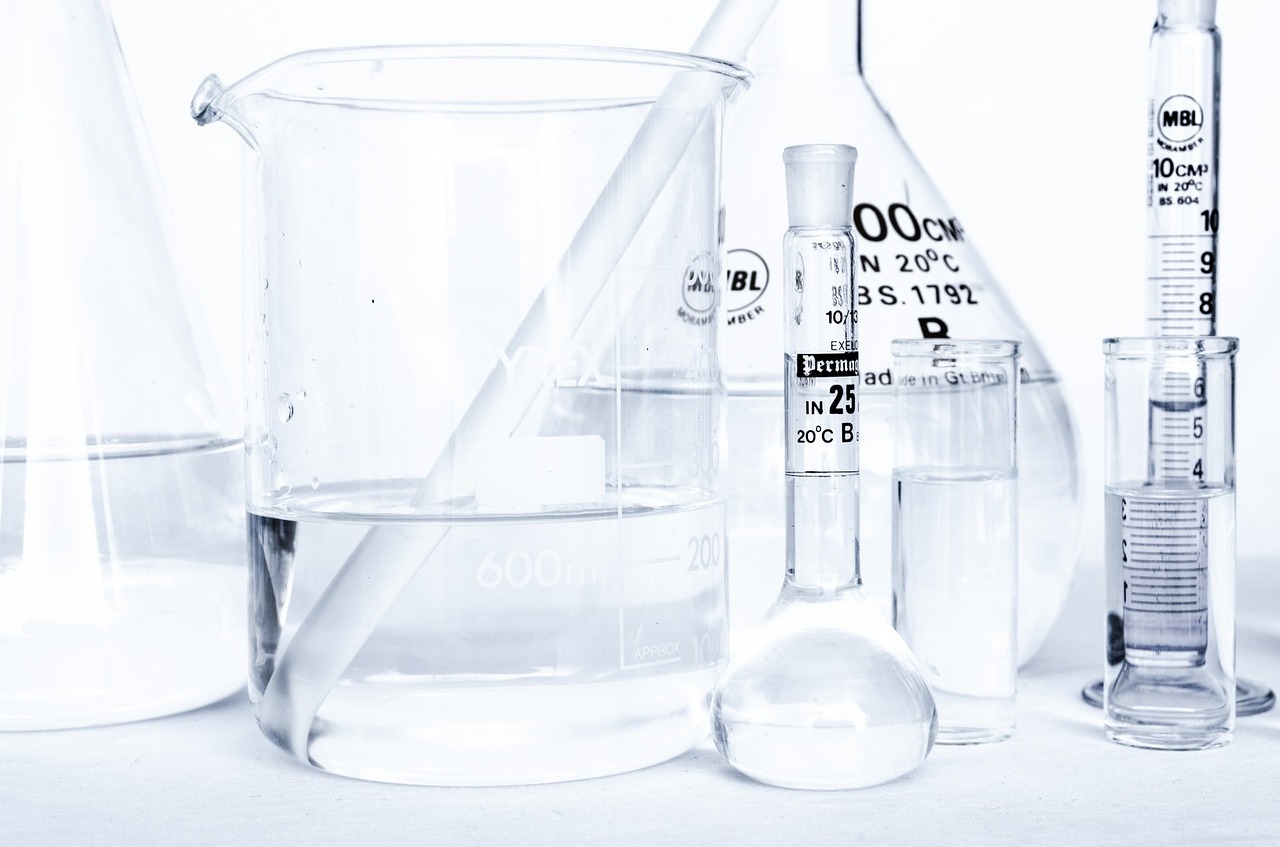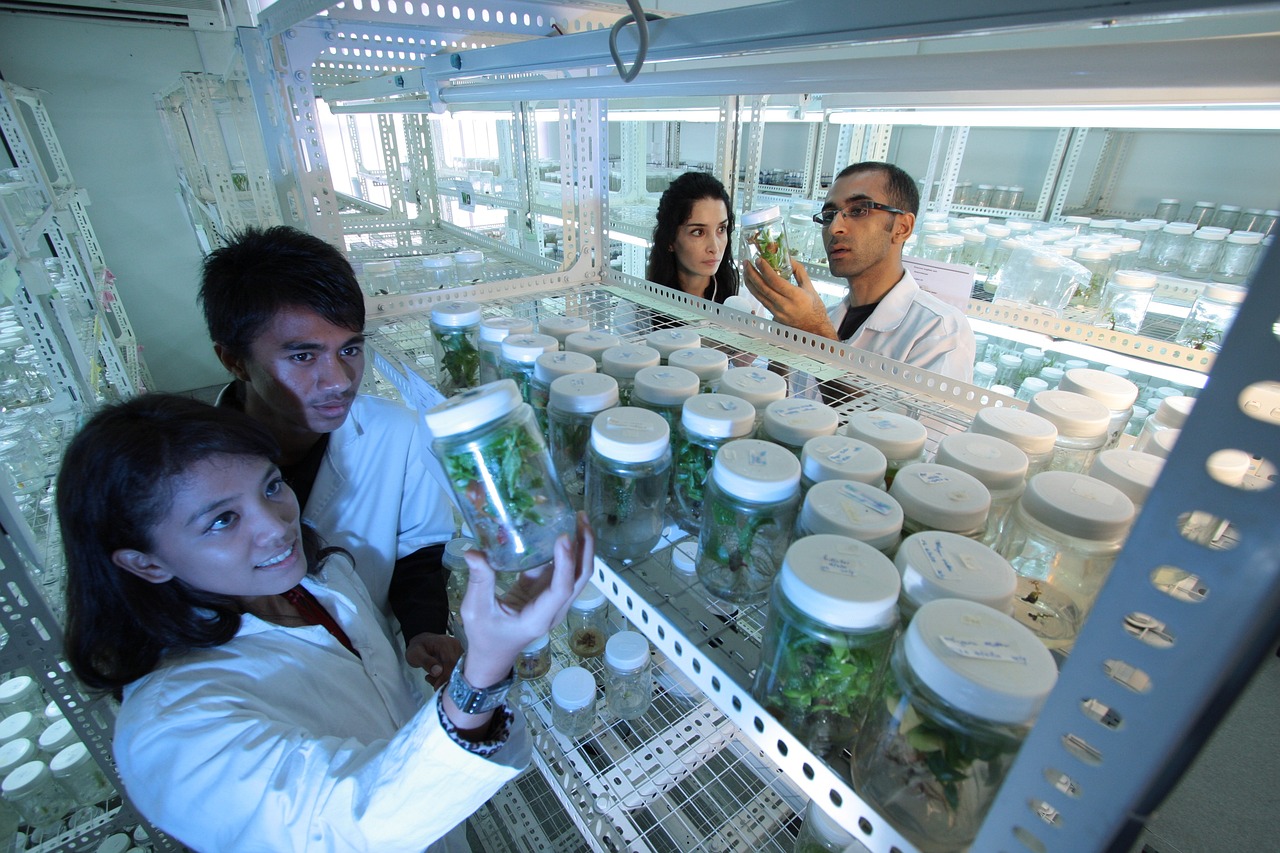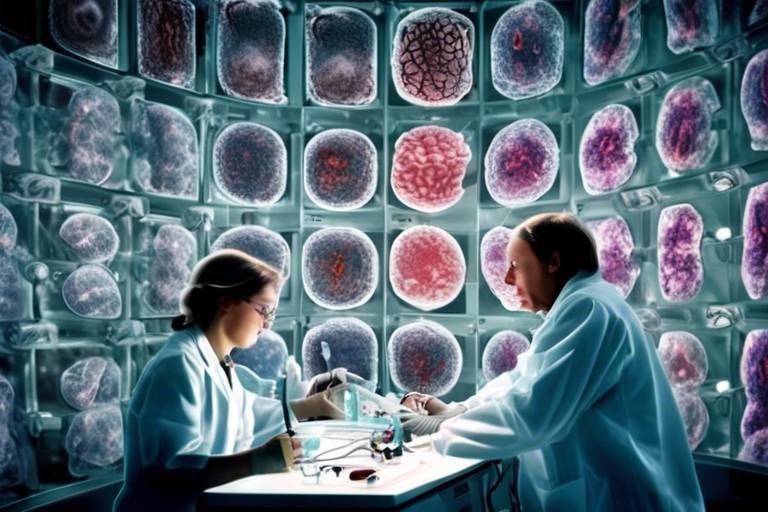The Morality of Stem Cell Research - A Philosophical Debate
Stem cell research has become a lightning rod for ethical discussions, igniting passionate debates that cut across various disciplines and societal beliefs. As we delve into the complexities of this issue, we find ourselves grappling with profound questions: What does it mean to be human? When does life truly begin? And, perhaps most importantly, how do we balance the potential for groundbreaking medical advancements against the moral implications of our choices? This article aims to explore the ethical implications of stem cell research, examining various philosophical perspectives, societal impacts, and the ongoing debate surrounding this contentious topic.
The core of this debate lies in the very nature of stem cells themselves. These remarkable cells have the potential to develop into any type of cell in the body, offering hope for the treatment of numerous diseases, from Parkinson's to diabetes. However, the source of these cells—often derived from human embryos—raises significant ethical concerns. Are we sacrificing potential human life for the sake of medical progress? This question is not merely academic; it resonates deeply with our values, beliefs, and the very essence of what it means to live and thrive as human beings.
As we navigate through this philosophical landscape, it’s essential to recognize that the morality of stem cell research is not a black-and-white issue. It is a tapestry woven with threads of scientific inquiry, ethical reasoning, and emotional responses. Different philosophical frameworks offer varied interpretations of when life begins, significantly influencing the moral debate surrounding stem cell research. For example, utilitarianism evaluates the greatest good for the greatest number, raising questions about the ethical justification of stem cell research in terms of potential benefits versus harms to society. On the other hand, deontological ethics focuses on the inherent rights of individuals, prompting critical discussions about the moral status of embryos and the ethical implications of their use in research.
Moreover, the societal impacts of stem cell research cannot be understated. Public opinion plays a crucial role in shaping the policies that govern this research. Surveys and polls often reveal a spectrum of attitudes, reflecting the complexities of ethical considerations in policymaking. Advocacy groups, too, have emerged as significant players in this arena, working tirelessly to influence legislation and public discourse surrounding stem cell research. Their efforts often reflect broader ethical concerns within society, highlighting the dynamic interplay between science, ethics, and public sentiment.
In conclusion, the morality of stem cell research is a rich and multifaceted topic that invites us to reflect on our values and beliefs. As we stand at the crossroads of scientific advancement and ethical responsibility, we must remain vigilant in our discussions, ensuring that moral considerations remain at the forefront of research initiatives. The path forward requires not only scientific innovation but also a commitment to ethical deliberation that honors the complexities of human life.
- What are stem cells? Stem cells are unique cells capable of developing into various cell types in the body, offering significant potential for medical treatments.
- Why is stem cell research controversial? The controversy primarily arises from the source of embryonic stem cells, which raises ethical questions about the status of human embryos.
- What are the potential benefits of stem cell research? Stem cell research has the potential to lead to groundbreaking treatments for diseases such as Parkinson's, diabetes, and spinal cord injuries.
- How do different philosophies view stem cell research? Utilitarianism focuses on the outcomes and benefits to society, while deontological ethics emphasizes the rights and moral status of embryos.
- What role does public opinion play in stem cell research? Public opinion influences ethical policies and legislative decisions, reflecting societal attitudes towards the moral implications of stem cell research.

Historical Context of Stem Cell Research
The journey of stem cell research is as intricate as the science behind it. It began in the early 20th century, when scientists first identified the unique properties of stem cells. These cells, capable of developing into various cell types, sparked intrigue and hope for revolutionary treatments. The term "stem cell" was coined in the 1960s, marking a significant milestone in our understanding of cellular biology. However, it wasn't until the late 1990s that stem cell research gained substantial traction, particularly with the successful extraction of embryonic stem cells from human embryos. This breakthrough ignited a firestorm of ethical debate, as it raised fundamental questions about the moral status of embryos and the implications of their use in research.
As we delve deeper into the historical context, it's crucial to recognize the pivotal events that shaped public perception and policy. The 2001 announcement by President George W. Bush, which limited federal funding for embryonic stem cell research to existing cell lines, exemplified the tension between scientific progress and ethical concerns. This decision not only influenced research funding but also polarized public opinion, leading to a national debate that continues to this day.
In the years that followed, various countries took different approaches to stem cell research. For instance, the United Kingdom adopted a more permissive stance, allowing for the creation of new embryonic stem cell lines under strict regulations. Conversely, countries like Germany imposed stringent restrictions, reflecting a cautious approach to the ethical dilemmas posed by this research.
To better understand the global landscape of stem cell research, consider the following table that highlights the regulatory frameworks in several key countries:
| Country | Regulatory Approach | Key Legislation |
|---|---|---|
| United States | Mixed; federal funding limited | Stem Cell Research Enhancement Act (2005) |
| United Kingdom | Permissive with regulations | Human Fertilisation and Embryology Act (1990) |
| Germany | Strict restrictions | Embryo Protection Act (1990) |
| Japan | Supportive, with ethical guidelines | Guidelines on Human Stem Cell Research (2001) |
As we move forward, it is essential to recognize that the historical context of stem cell research is not just a timeline of scientific advancements; it is also a reflection of societal values and ethical considerations. The debates that arose from these early developments laid the groundwork for the ongoing discussions we have today. The evolution of stem cell research illustrates how science and ethics are intertwined, shaping our understanding of life, human dignity, and the potential for medical breakthroughs.
Ultimately, the historical context serves as a reminder that every scientific leap comes with its own set of moral questions. As we continue to explore the capabilities of stem cells, we must remain vigilant in addressing the ethical implications that accompany these advancements.

Philosophical Perspectives on Life
The debate surrounding stem cell research is deeply intertwined with various philosophical perspectives on life. Understanding these perspectives is crucial, as they shape our views on when life begins and the moral implications of using embryonic cells for research. At the heart of this discussion lies the question: What does it mean to be alive? Different schools of thought provide different answers, leading to a complex web of ethical considerations.
One prominent viewpoint is rooted in utilitarianism, which suggests that the morality of an action is determined by its outcomes. In the context of stem cell research, utilitarians argue that the potential benefits—such as curing diseases or alleviating suffering—outweigh the ethical concerns associated with the destruction of embryos. This perspective raises a critical question: Should the potential to save lives justify the means of obtaining those lives? Supporters of this view often emphasize the importance of maximizing happiness and minimizing suffering, creating a compelling argument for the continuation of stem cell research.
On the other hand, deontological ethics offers a contrasting perspective. This framework asserts that certain actions are inherently right or wrong, regardless of their consequences. From this viewpoint, the moral status of embryos becomes a focal point of the debate. Proponents of deontological ethics argue that embryos possess inherent rights and dignity, and thus, their destruction for research purposes is morally unacceptable. This perspective invites us to reflect on the fundamental question of what rights, if any, should embryos have? It challenges us to consider the implications of treating potential life as a means to an end.
Moreover, the philosophical discourse on life often intersects with religious beliefs, further complicating the ethical landscape. For instance, many religious traditions hold that life begins at conception, framing embryonic stem cell research as a violation of sacred principles. These beliefs can influence public opinion and policy, leading to heated debates in legislative arenas. As we navigate this complex terrain, it is essential to recognize that philosophical perspectives are not merely theoretical; they have real-world implications that affect individuals, families, and society at large.
In exploring these philosophical frameworks, we uncover a rich tapestry of thought that highlights the nuances and complexities of the stem cell research debate. Each perspective brings valuable insights, challenging us to think critically about the implications of our choices. Ultimately, the question of when life begins is not just a scientific inquiry; it is a profound moral dilemma that invites us to consider our values, beliefs, and responsibilities as stewards of life.
- What is the primary ethical concern regarding stem cell research? The primary ethical concern revolves around the moral status of embryos and whether their destruction for research purposes is justified.
- How do utilitarian and deontological ethics differ in their approach to stem cell research? Utilitarianism focuses on the outcomes and benefits of research, while deontological ethics emphasizes the inherent rights and dignity of embryos.
- What role do religious beliefs play in the stem cell research debate? Religious beliefs significantly influence opinions on the morality of stem cell research, often framing discussions around the sanctity of life.

Utilitarianism and Stem Cell Research
Utilitarianism, a consequentialist ethical theory, posits that the moral worth of an action is determined by its overall contribution to happiness or utility. In the context of stem cell research, this perspective prompts us to evaluate the potential benefits of such research against its moral costs. Advocates of utilitarianism argue that if stem cell research can lead to significant medical breakthroughs—such as cures for debilitating diseases or advancements in regenerative medicine—then the ethical justification for this research becomes compelling. The key question here is: can the potential to alleviate suffering for many outweigh the moral concerns associated with the use of embryos in research?
To explore this further, consider the following potential benefits of stem cell research:
- Medical Advancements: Stem cell research holds the promise of treating conditions like Parkinson's disease, spinal cord injuries, and diabetes.
- Regenerative Medicine: The ability to regenerate damaged tissues and organs could revolutionize healthcare.
- Understanding Diseases: Stem cells can be used to study the development of diseases, leading to better prevention strategies.
On the flip side, utilitarianism also requires us to weigh the risks and harms associated with stem cell research. Critics often point to the moral implications of using human embryos, raising questions about when life begins and the rights of these embryos. This leads to a significant ethical dilemma: how do we balance the potential happiness and health benefits for society against the moral costs of embryo destruction? Utilitarianism suggests that if the overall benefits to society are greater than the harms incurred, then the research is justified. However, this calculation is far from straightforward.
Moreover, the utilitarian approach encourages ongoing dialogue and assessment. It is not merely about making a one-time decision; it involves continually evaluating the outcomes of stem cell research and its impact on society. As scientific advancements unfold, the ethical landscape may shift, prompting new considerations regarding the justification of such research. This fluidity in moral reasoning reflects the dynamic nature of both ethics and science, reminding us that what may seem acceptable today could be challenged tomorrow.
In conclusion, while utilitarianism provides a compelling framework for evaluating the ethics of stem cell research, it also invites us to engage in critical discussions about the value of human life, the nature of suffering, and the responsibilities of scientific inquiry. As we move forward, the dialogue surrounding these issues will be crucial in shaping both public policy and societal attitudes toward this transformative field of research.

Balancing Risks and Benefits
When we dive into the murky waters of stem cell research, one of the biggest questions that arises is how we can effectively balance the risks and benefits associated with this groundbreaking field. It's a bit like walking a tightrope; on one side, we have the potential for revolutionary medical treatments that could alleviate suffering and save lives, while on the other side, we face ethical dilemmas and concerns about the moral status of embryos. This balancing act is crucial, as it shapes not only the future of medical science but also the societal acceptance of these innovations.
To truly understand this balance, we need to look at both sides of the equation. On the benefits side, stem cell research holds the promise of curing diseases that have long plagued humanity, such as Parkinson's, diabetes, and spinal cord injuries. Imagine a world where debilitating conditions are no longer a life sentence! The potential for regenerative medicine, where damaged tissues and organs can be repaired or replaced, is nothing short of miraculous.
However, with great power comes great responsibility. The risks associated with stem cell research cannot be ignored. There are significant ethical concerns regarding the sourcing of stem cells, particularly when it involves embryos. Many argue that this practice undermines the sanctity of life. Additionally, there are scientific risks, such as the potential for tumor formation or the rejection of stem cell transplants by the immune system. These uncertainties can lead to public fear and skepticism, which can hinder research progress.
To illustrate this balance, consider the following table that outlines the key risks and benefits:
| Benefits | Risks |
|---|---|
| Potential to cure chronic diseases | Ethical concerns regarding embryo use |
| Regenerative medicine advancements | Risk of tumor formation |
| Improved quality of life for patients | Immune rejection of stem cells |
| Innovative research leading to new therapies | Public fear and misinformation |
As we weigh these factors, it's essential to engage in open dialogue among scientists, ethicists, and the public. This conversation can lead to informed policymaking that prioritizes both scientific advancement and ethical integrity. It's not just about what we can do; it's about what we should do. By fostering understanding and addressing concerns, we can create a framework that respects both the potential of stem cell research and the moral implications it carries.
Ultimately, the goal is to ensure that the benefits of stem cell research are realized while minimizing the risks. This delicate balance is what will guide the future of this promising field, allowing us to navigate through its complexities with both caution and optimism.
- What are stem cells? Stem cells are undifferentiated cells that have the potential to develop into various cell types in the body, making them crucial for medical research and therapies.
- Why is there controversy surrounding stem cell research? The controversy primarily stems from ethical concerns regarding the use of human embryos in research, which some believe raises moral issues about the beginning of life.
- What diseases can stem cell research potentially cure? Stem cell research has the potential to treat a variety of conditions, including Parkinson's disease, spinal cord injuries, diabetes, and certain types of cancer.
- How is public opinion influencing stem cell research? Public opinion can significantly affect legislation and funding for stem cell research, often swaying policymakers based on societal values and ethical concerns.

Consequentialist Arguments
When we dive into the world of consequentialism, we find ourselves evaluating actions based on their outcomes. In the context of stem cell research, this perspective is particularly compelling. Proponents argue that the potential benefits of stem cell research far outweigh the ethical dilemmas posed by the use of embryos. Imagine a world where debilitating diseases such as Parkinson's, Alzheimer's, or spinal cord injuries could be treated or even cured through innovative stem cell therapies. This vision drives the consequentialist argument forward, suggesting that the positive impact on countless lives justifies the moral complexities involved.
To illustrate this point, consider the following potential benefits of stem cell research:
- Regenerative Medicine: Stem cells have the unique ability to develop into different cell types, offering the possibility of regenerating damaged tissues and organs.
- Reduction of Suffering: By providing effective treatments for chronic illnesses, stem cell research has the potential to alleviate immense suffering for patients and their families.
- Economic Benefits: Advancements in medical treatments can lead to reduced healthcare costs and increased productivity, benefiting society as a whole.
However, it’s essential to acknowledge the concerns raised by critics who argue that the potential for abuse and ethical violations cannot be ignored. They warn that prioritizing outcomes may lead to a slippery slope where the sanctity of life is compromised in the name of progress. Thus, while consequentialist arguments emphasize the positive outcomes of stem cell research, they also necessitate a careful examination of the ethical frameworks that guide these advancements. Balancing the pursuit of medical breakthroughs with a commitment to ethical standards remains a crucial challenge.
In summary, the consequentialist perspective sheds light on the profound implications of stem cell research, focusing on the potential benefits that could revolutionize medicine. As we navigate this complex landscape, the conversation must continue, ensuring that ethical considerations are woven into the fabric of scientific exploration.
Q1: What are stem cells?
Stem cells are unique cells capable of developing into various cell types in the body. They play a crucial role in growth, development, and repair.
Q2: Why is stem cell research controversial?
The controversy primarily arises from ethical concerns regarding the use of embryos in research, as well as differing beliefs about when life begins.
Q3: What are the potential benefits of stem cell research?
Stem cell research holds the promise of treating chronic diseases, regenerating damaged tissues, and advancing our understanding of human development.
Q4: How do different philosophical perspectives influence the debate?
Philosophical frameworks, such as utilitarianism and deontological ethics, provide varied interpretations of the moral implications of stem cell research, shaping public opinion and policy.

Deontological Ethics and Rights
Deontological ethics, rooted in the philosophy of Immanuel Kant, emphasizes the importance of duty and the inherent rights of individuals. This ethical framework posits that actions must be judged based on their adherence to rules or duties, rather than solely on the consequences they produce. When it comes to stem cell research, deontological ethics invites us to engage in deep discussions about the moral status of embryos. Are embryos mere clusters of cells, or do they possess an intrinsic value that demands respect and protection?
At the heart of the deontological perspective is the belief that every human being, regardless of their developmental stage, has rights that must be upheld. This leads to important questions about the ethical implications of using embryos for research purposes. For many, the idea of creating and then destroying embryos for scientific advancement feels like a violation of fundamental rights. The moral principle here is that individuals should not be treated merely as a means to an end, which raises significant concerns about the ethicality of stem cell research practices.
Critics of embryonic stem cell research often argue that it undermines the dignity of human life by commodifying embryos. They contend that the potential for medical breakthroughs does not justify the moral cost of creating and discarding life. In contrast, proponents argue that the research holds the promise of curing debilitating diseases and alleviating human suffering, which can be seen as a duty to improve the human condition.
To better understand the implications of deontological ethics in this context, consider the following key points:
- Intrinsic Value of Life: Deontologists argue that life, even at its earliest stages, has inherent worth that must be respected.
- Rights of the Embryo: The debate centers around whether embryos have rights that protect them from being used as mere tools for scientific progress.
- Duty to Protect Life: Many deontologists believe there is a moral obligation to safeguard all forms of life, which complicates the justification for stem cell research.
This ethical framework compels us to consider not only the potential benefits of stem cell research but also the moral implications of our choices. As society grapples with these issues, it’s essential to engage in thoughtful dialogue that respects diverse perspectives while striving for a balanced approach to medical ethics.
Q: What is deontological ethics?
A: Deontological ethics is a moral philosophy that emphasizes the importance of following rules and duties when making ethical decisions, focusing on the inherent rights of individuals.
Q: How does deontological ethics apply to stem cell research?
A: It raises questions about the moral status of embryos and whether they possess rights that should be protected, emphasizing that individuals should not be treated merely as means to an end.
Q: What are the main concerns of critics regarding stem cell research?
A: Critics often argue that stem cell research undermines the dignity of human life and that the potential benefits do not justify the moral cost of creating and destroying embryos.

Religious Perspectives on Stem Cell Research
The ethical landscape of stem cell research is profoundly influenced by religious beliefs, which shape the moral judgments of individuals and communities. Different faith traditions bring unique perspectives to the table, often leading to passionate debates about the implications of using embryonic stem cells in research. For many, these discussions are not merely academic; they touch on deeply held convictions about the sanctity of life and the moral status of embryos.
In Christianity, for example, the belief in the sanctity of life is paramount. Many Christian denominations argue that life begins at conception, thus viewing embryos as human beings with inherent rights. This perspective leads to strong opposition against embryonic stem cell research, as it is seen as a violation of the moral obligation to protect innocent life. The Catholic Church, in particular, has been vocal in its condemnation of research that involves the destruction of embryos, advocating instead for alternatives such as adult stem cell research, which does not involve ethical dilemmas related to embryo destruction.
On the other hand, Islamic teachings also provide a nuanced view on medical ethics and the use of stem cells. Islamic scholars often emphasize the importance of preserving human life while also recognizing the potential benefits that stem cell research can offer. The concept of Maslahah, or public interest, plays a crucial role in Islamic ethical deliberations, suggesting that if stem cell research can lead to significant medical advancements, it may be permissible under certain conditions. This perspective encourages a balance between the pursuit of medical innovation and the respect for human life, illustrating how religious beliefs can lead to diverse interpretations of ethical issues.
Moreover, the debate extends beyond Christianity and Islam. Other faith traditions, such as Judaism, also engage with the ethical implications of stem cell research, often highlighting the importance of healing and the preservation of life. Jewish law, or Halakha, places a strong emphasis on the value of life and health, which can lead to support for research that has the potential to save lives, albeit with careful consideration of the ethical implications involved.
In this complex landscape, it becomes evident that religious perspectives on stem cell research are not monolithic. They reflect a rich tapestry of beliefs and values that inform individual and collective ethical stances. As society grapples with the implications of scientific advancements, the voices of religious communities will continue to play a significant role in shaping public discourse and policy decisions surrounding stem cell research.
- What is the main ethical concern regarding stem cell research from a religious perspective?
Many religious groups express concern over the moral status of embryos, viewing them as human lives that deserve protection. - Do all religions oppose embryonic stem cell research?
No, while some religions like certain Christian denominations oppose it, others, such as Islam, may support it under specific conditions that prioritize public interest and medical benefits. - What alternatives to embryonic stem cell research do religious groups advocate for?
Many religious groups advocate for adult stem cell research or induced pluripotent stem cells, which do not involve the ethical dilemmas associated with embryos.

Christian Views on Life and Embryos
Christianity holds a profound respect for life, viewing it as a sacred gift from God. This belief fundamentally shapes the Christian perspective on stem cell research, particularly when it comes to the moral status of embryos. Many Christians argue that life begins at conception, and therefore, embryos should be afforded the same moral consideration as fully developed humans. This viewpoint raises significant ethical questions regarding the use of embryonic stem cells in research, leading to a strong opposition against such practices.
At the heart of the debate is the concept of the sanctity of life. Christians believe that every human being, regardless of their developmental stage, possesses inherent dignity and worth. This belief often translates into a call for the protection of human embryos, which are viewed as potential lives. For many, the idea of creating embryos for the sole purpose of research is seen as morally objectionable, equating it to the commodification of human life.
Moreover, various Christian denominations articulate their views on stem cell research through doctrinal teachings and ethical guidelines. For instance, the Catholic Church staunchly opposes embryonic stem cell research, emphasizing that it is morally unacceptable to destroy embryos for any reason. Instead, they advocate for the use of adult stem cells and other alternatives that do not involve the destruction of potential life. This stance is echoed by many Protestant denominations, although there are some that adopt a more nuanced approach, allowing for limited use of embryonic stem cells under specific circumstances.
In addition to theological arguments, many Christians also express their concerns about the potential societal implications of stem cell research. They worry that normalizing the use of embryos for research could lead to a slippery slope, where the value of human life is increasingly diminished in favor of scientific progress. This fear is compounded by the possibility of exploitation, particularly of vulnerable populations who may be pressured to donate embryos or participate in research.
Despite these concerns, there is a growing dialogue within the Christian community about the ethical implications of stem cell research. Some argue for a more balanced approach that considers both the potential benefits of scientific advancements in treating diseases and the moral obligations to protect life. This ongoing conversation reflects the complexity of the issue and the need for Christians to engage thoughtfully with both faith and reason in navigating the ethical landscape of stem cell research.
- What is the Christian stance on stem cell research?
Christianity generally opposes embryonic stem cell research due to the belief that life begins at conception, advocating instead for the use of adult stem cells.
- Why do Christians believe in the sanctity of life?
Christians believe that life is a sacred gift from God, which grants every human, including embryos, inherent dignity and worth.
- Are there any exceptions in Christian views on stem cell research?
Some denominations may allow limited use of embryonic stem cells under specific circumstances, but this varies widely among different Christian groups.
- How do Christians view the potential benefits of stem cell research?
While many acknowledge the potential medical benefits, they emphasize the importance of ethical considerations and the protection of human life.

Islamic Perspectives on Medical Ethics
When it comes to the intersection of medical ethics and stem cell research, Islamic perspectives provide a rich tapestry of insights grounded in both religious teachings and cultural practices. In Islam, the preservation of human life is paramount, and this principle significantly influences the discourse surrounding the use of embryonic stem cells. The teachings of the Quran and Hadith (sayings of the Prophet Muhammad) emphasize the sanctity of life, which leads to a cautious approach to any medical advancements that could potentially undermine this value.
One of the core tenets of Islamic medical ethics is the concept of Sharia, or Islamic law, which serves as a guiding framework for ethical decision-making. Within this framework, the moral status of the embryo is a critical point of discussion. Many Islamic scholars argue that life begins at conception, which raises profound ethical questions about the use of embryos in research. Consequently, the extraction of stem cells from embryos is often viewed with skepticism, as it may be perceived as taking a life, even if the intention is to save or improve other lives.
However, the Islamic perspective is not monolithic. There are varying interpretations among scholars regarding the permissibility of stem cell research. Some argue that if the research can lead to significant medical breakthroughs that could alleviate suffering, it may be justified under the principle of Maslahah (public interest). This principle allows for actions that may seem ethically ambiguous if they yield a greater benefit to society as a whole. In this context, the potential for stem cell therapies to treat debilitating diseases could be seen as a compelling reason to pursue this line of research.
Moreover, the Islamic ethical framework also emphasizes the importance of intention (niyyah) behind actions. If the intention behind stem cell research is to help humanity and alleviate suffering, some scholars may support it, provided that the research adheres to ethical guidelines and respects the dignity of all human life. This nuanced understanding reflects a broader Islamic commitment to balancing the pursuit of knowledge with moral responsibility.
To illustrate the diversity of opinions within the Islamic community, it's helpful to consider a table summarizing various perspectives on stem cell research:
| Perspective | Viewpoint |
|---|---|
| Conservative Scholars | Oppose embryonic stem cell research due to the belief that life begins at conception. |
| Moderate Scholars | Support research if it leads to significant medical benefits and adheres to ethical guidelines. |
| Progressive Scholars | Advocate for the use of stem cells, emphasizing the importance of alleviating human suffering. |
In conclusion, the Islamic perspective on medical ethics in relation to stem cell research is complex and multifaceted. It navigates the delicate balance between respecting the sanctity of life and embracing the potential for scientific advancements that can benefit humanity. As the field of stem cell research continues to evolve, ongoing dialogue within the Islamic community will be essential to address the ethical challenges and opportunities that arise.
- What is the Islamic view on the use of embryonic stem cells? The Islamic view varies, with some scholars opposing it based on the belief that life begins at conception, while others may support it if it serves a greater good.
- How does the principle of Maslahah apply to stem cell research? Maslahah, or public interest, may justify stem cell research if it leads to significant medical advancements that benefit society.
- Are there any specific guidelines for conducting stem cell research in Islam? Yes, research should adhere to ethical guidelines that respect the dignity of human life and align with Islamic teachings.

Public Opinion and Ethical Policy
The landscape of public opinion regarding stem cell research is as complex and varied as the scientific field itself. As society grapples with the ethical implications of this groundbreaking research, the views of the public play a crucial role in shaping policy decisions. The ethical policies that govern stem cell research are often a reflection of the collective beliefs, fears, and hopes of the community. This interplay between public sentiment and ethical governance can create a dynamic environment where laws are continually evolving.
Surveys and polls have become essential tools for understanding how the public perceives stem cell research. For instance, a survey conducted by the National Institutes of Health revealed that approximately 60% of respondents support stem cell research, particularly when it promises to lead to significant medical advancements. However, this support often comes with caveats; many individuals express concerns regarding the ethical implications of using embryonic stem cells.
Furthermore, the public's stance on stem cell research can vary significantly based on factors such as age, education, and religious beliefs. Younger individuals tend to be more supportive of stem cell research compared to older generations, who may hold more traditional views on the sanctity of life. Education also plays a pivotal role; those with a higher level of education often demonstrate a more nuanced understanding of the potential benefits and ethical dilemmas associated with stem cell research.
| Demographic Factor | Support for Stem Cell Research |
|---|---|
| Age (18-34) | 75% |
| Age (35-54) | 65% |
| Age (55+) | 50% |
| College Educated | 70% |
| High School Education | 55% |
Advocacy groups also play a vital role in shaping public opinion and influencing ethical policies related to stem cell research. These organizations often mobilize public support, raise awareness about the potential benefits of stem cell therapies, and advocate for more progressive legislation. They serve as a bridge between scientific communities and the general public, helping to demystify the research and address common misconceptions.
On the flip side, there are also advocacy groups that oppose stem cell research, particularly those focused on the moral implications of using embryos in research. These organizations often emphasize the need to protect human life from conception, framing their arguments in terms of rights and ethics. This dichotomy in advocacy highlights the ongoing struggle between progress in medical science and adherence to ethical principles.
As public opinion continues to evolve, ethical policies surrounding stem cell research must adapt accordingly. Policymakers are increasingly recognizing the importance of engaging with the public to formulate guidelines that reflect societal values while also promoting scientific advancement. This ongoing dialogue is essential for fostering an environment where innovation can thrive without compromising ethical integrity.
- What is stem cell research? Stem cell research involves studying stem cells to understand their properties and potential applications in medicine.
- Why is public opinion important in stem cell research? Public opinion influences policy decisions, funding, and the direction of research, ensuring that ethical considerations align with societal values.
- How do advocacy groups impact stem cell research? Advocacy groups can shape public discourse, mobilize support, and influence legislation, reflecting broader ethical concerns within society.
- What are the main ethical concerns surrounding stem cell research? Key concerns include the moral status of embryos, the potential for exploitation, and the implications of genetic manipulation.

Surveys and Polls on Stem Cell Research
When it comes to understanding societal attitudes towards stem cell research, surveys and polls serve as invaluable tools. They provide a snapshot of public opinion, revealing how people feel about the ethical implications and potential benefits of this complex field. For instance, a recent survey conducted by the Pew Research Center found that 60% of Americans support stem cell research, while only 30% oppose it. This data reflects a growing acceptance of the scientific advancements that stem cell research can bring, particularly in the realm of treating debilitating diseases.
However, the results can vary significantly based on demographic factors such as age, education, and religious beliefs. Younger individuals tend to show more support for stem cell research compared to older generations, who may hold more traditional views on the sanctity of life. A 2019 Gallup poll indicated that 73% of college graduates favored stem cell research, compared to just 50% of those without a college degree. This disparity highlights how education plays a crucial role in shaping opinions on this issue.
Moreover, religious affiliations also influence public sentiment. For example, a survey by the American Association for the Advancement of Science revealed that only 25% of evangelical Christians support embryonic stem cell research, while 70% of non-religious individuals are in favor. This stark contrast underscores the complexities of the moral debate surrounding stem cell research, where personal beliefs intersect with scientific progress.
As we analyze these survey results, it's crucial to consider not just the numbers but also the nuances behind them. Many respondents express conditional support, indicating that they would back stem cell research only if it adheres to strict ethical guidelines. This highlights a broader concern regarding the governance of scientific research and the necessity for regulations that align with public values.
To further illustrate the diversity of opinions, the following table summarizes key findings from various polls on stem cell research:
| Source | Support (%) | Oppose (%) |
|---|---|---|
| Pew Research Center (2022) | 60 | 30 |
| Gallup Poll (2019) | 73 (College Graduates) | 50 (Non-Graduates) |
| American Association for the Advancement of Science | 70 (Non-Religious) | 25 (Evangelical Christians) |
These statistics not only highlight the general support for stem cell research but also reveal the deep-seated ethical concerns that accompany it. As public opinion continues to evolve, it becomes increasingly important for policymakers to consider these perspectives when drafting legislation and ethical guidelines for stem cell research. The ongoing dialogue between scientists, ethicists, and the public will ultimately shape the future of this promising field.
- What is stem cell research? Stem cell research involves studying stem cells, which have the unique ability to develop into different cell types, to understand their potential in treating various diseases.
- Why is there controversy surrounding stem cell research? The controversy largely stems from ethical concerns regarding the use of human embryos in research, with differing opinions on when life begins.
- How do surveys influence public policy on stem cell research? Surveys provide lawmakers with insights into public sentiment, helping to guide ethical policies and funding decisions related to stem cell research.

Impact of Advocacy Groups
The role of advocacy groups in the realm of stem cell research cannot be overstated. These organizations serve as the voice of various stakeholders, from scientists and medical professionals to patients and their families. By raising awareness, providing education, and mobilizing public support, advocacy groups play a crucial role in shaping the narrative surrounding stem cell research. They often bridge the gap between scientific communities and the general public, making complex scientific issues more accessible and understandable.
One of the most significant impacts of advocacy groups is their ability to influence legislation. For instance, many advocacy organizations actively lobby for increased funding for stem cell research, arguing that it holds the potential for groundbreaking medical advancements that could save countless lives. They present compelling evidence and personal stories that resonate with lawmakers, urging them to consider the broader implications of their decisions. This advocacy is essential, especially in a political landscape where funding for scientific research can be contentious and heavily debated.
Moreover, advocacy groups often conduct surveys and polls to gauge public opinion on stem cell research. The results of these surveys can provide valuable insights into societal attitudes and help shape the strategies of both the advocacy groups and policymakers. For example, when a poll reveals a significant portion of the population supports stem cell research, advocacy groups can leverage that data to further their cause, demonstrating to legislators that there is a strong public mandate for research initiatives.
In addition to influencing legislation and public opinion, advocacy groups also contribute to the ethical discourse surrounding stem cell research. They often host forums, workshops, and discussions that bring together ethicists, scientists, and the public to explore the moral implications of stem cell research. This dialogue is vital in a field where ethical considerations are as important as scientific advancements. By facilitating these conversations, advocacy groups help ensure that the voices of various stakeholders are heard, fostering a more inclusive debate.
Furthermore, advocacy groups can mobilize grassroots campaigns that encourage community engagement. These campaigns often include educational outreach, social media initiatives, and public demonstrations aimed at raising awareness about the potential benefits of stem cell research. By engaging the community, these organizations not only promote their agenda but also empower individuals to take an active role in the decision-making processes that affect their lives.
In conclusion, advocacy groups are instrumental in shaping the landscape of stem cell research. Their efforts to influence legislation, educate the public, facilitate ethical discussions, and mobilize community support are vital for the advancement of this critical field. As the debate continues, the impact of these organizations will undoubtedly play a significant role in determining the future of stem cell research and its implications for society.
- What is the primary goal of advocacy groups in stem cell research?
Advocacy groups aim to raise awareness, influence legislation, and promote ethical discussions surrounding stem cell research. - How do advocacy groups influence public opinion?
They conduct surveys and polls, organize educational campaigns, and engage communities to gauge and shape societal attitudes towards stem cell research. - Why is public support important for stem cell research?
Public support can lead to increased funding and more favorable legislation, making it essential for the advancement of research initiatives.

Future Directions in Stem Cell Research
The future of stem cell research is as exciting as it is complex, filled with potential breakthroughs that could revolutionize medicine and our understanding of human biology. As we move forward, several key areas are emerging that promise to shape the landscape of this field. One significant direction is the continued exploration of induced pluripotent stem cells (iPSCs). These cells, which can be generated from adult tissues, offer a unique opportunity to create patient-specific therapies without the ethical concerns associated with embryonic stem cells. Imagine a world where a simple skin biopsy could lead to personalized treatments for diseases like Parkinson's or diabetes!
Another promising avenue is the integration of stem cell therapy with advanced technologies such as gene editing. Techniques like CRISPR-Cas9 are enabling researchers to not only modify stem cells but also to correct genetic defects at the source. This could potentially lead to cures for genetic disorders that have plagued families for generations. However, this also raises ethical questions about how far we should go in altering human genetics, making it imperative to engage in ongoing discussions about the moral implications of these advancements.
Moreover, the application of stem cells in regenerative medicine is gaining momentum. Scientists are investigating ways to use stem cells to regenerate damaged tissues and organs. For example, researchers are working on creating bioengineered organs using stem cells, which could alleviate the shortage of organ donations. The potential to create a functioning heart or kidney in a lab is not just science fiction; it’s rapidly becoming a reality. Yet, this raises the question: what ethical guidelines should govern the creation and use of such organs?
As we look to the future, it’s also essential to consider the role of public policy and funding in stem cell research. The landscape of funding can greatly influence the direction of research. Countries with supportive policies may lead the way in innovation, while those with restrictive regulations may lag behind. This disparity can create a global divide in the advancements made in stem cell therapies. Hence, fostering an environment that encourages ethical research while ensuring public safety is crucial.
In addition, the collaboration between scientists, ethicists, and policymakers is vital for the responsible advancement of stem cell research. Establishing interdisciplinary committees can help navigate the complex moral landscape, ensuring that scientific progress does not outpace ethical considerations. This collaborative approach can pave the way for guidelines that protect human dignity while allowing for groundbreaking research.
Lastly, as we forge ahead, it is essential to engage the public in discussions about stem cell research. Awareness and education can demystify the science and ethical dilemmas surrounding this field. By fostering an informed public discourse, we can bridge the gap between scientific communities and society at large, ensuring that the future of stem cell research aligns with the values and concerns of the public.
- What are the main types of stem cells? There are two primary types: embryonic stem cells, which are derived from embryos, and adult stem cells, which are found in various tissues.
- How can stem cells be used in medicine? Stem cells can potentially treat a variety of conditions, including degenerative diseases, injuries, and genetic disorders.
- What ethical concerns surround stem cell research? The main ethical concerns include the moral status of embryos and the implications of genetic editing.
- What is the future of stem cell research? The future includes advancements in personalized medicine, regenerative therapies, and the integration of new technologies like gene editing.
Frequently Asked Questions
- What are stem cells, and why are they important?
Stem cells are unique cells in the body that have the ability to develop into many different cell types. They are crucial for medical research because they can potentially treat a variety of diseases, including diabetes, Parkinson's disease, and spinal cord injuries. Their ability to regenerate damaged tissues makes them a hot topic in both science and ethics.
- What are the ethical concerns surrounding stem cell research?
The ethical concerns primarily revolve around the use of embryonic stem cells, which are derived from human embryos. Many argue that this process involves moral dilemmas regarding the status of the embryo, leading to debates about when life begins and whether it is ethical to use embryos for research. These discussions often draw from various philosophical, religious, and cultural perspectives.
- How do different philosophical perspectives influence the debate?
Various philosophical frameworks, such as utilitarianism and deontological ethics, shape the conversation about stem cell research. Utilitarianism focuses on the potential benefits for society, advocating for research that could lead to significant medical breakthroughs. In contrast, deontological ethics emphasizes the inherent rights of individuals, raising questions about the moral status of embryos and the ethical implications of their use.
- What role do religious beliefs play in the discussion of stem cell research?
Religious beliefs significantly influence opinions on stem cell research. For example, many Christian groups uphold the sanctity of life and oppose embryonic stem cell research, arguing for the protection of human embryos. In contrast, Islamic perspectives may support medical advancements while also emphasizing the importance of preserving human life, leading to a more nuanced view.
- How does public opinion impact stem cell research policies?
Public opinion plays a vital role in shaping the ethical policies and legislative decisions surrounding stem cell research. Surveys and polls often reflect a range of attitudes, from strong support for research to significant opposition. Advocacy groups also help to influence public discourse, pushing for policies that align with their ethical concerns and societal values.
- What does the future hold for stem cell research?
The future of stem cell research is likely to be shaped by ongoing ethical debates, scientific advancements, and the need for responsible governance. As researchers continue to explore new techniques and applications, it will be crucial to ensure that ethical considerations remain at the forefront of research initiatives to address societal concerns effectively.



















